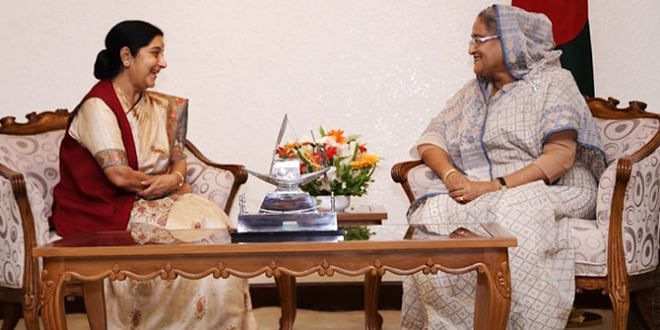Sushma visit: 36 hrs of quality time
Sushma visit: 36 hrs of quality time

INDIAN External Affairs Minister Sushma Swaraj's visit to Dhaka was impeccably organised, be it her homework on bilateral issues with great attention to detail, exchange of views across the table or carrying gifts for her Bangladeshi hosts on the sidelines. Sushma recalled buying sarees and presenting them to Hasina when as opposition leader the latter had visited New Delhi decades ago.
Let alone the government side, now it is BNP leader Khaleda Zia who has a gift of Jamdani saree at the ready to offer to Sushma when both meet. Khaleda's enthusiasm for the meeting is understandable as a leader of a major party and so is BJP's gesture in keeping touch with all major political parties in Bangladesh appreciated.
Sushma very thoughtfully made a phone call to West Bengal Chief Minister Mamata Banerjee before leaving for Dhaka. The UPA government's apparent miscommunication with Mamata had put a spanner in the works of Teesta pact. Mamata wished Sushma a useful visit requesting her to convey the chief minister's good wishes to the people and government of Bangladesh. A now apparently happy Mamata complained of the UPA government keeping her in the dark about developments on Teesta water treaty.
Anandabazar Patrika alluding to Mamata hilariously suggested that while Sushma discussed weighty issues with Bangladesh, she should not forget tasting Hilsha from Barisal and Bhola!
So much for the light-hearted and lively temper to any important Indian dignitary's trip-eve mood in an attempt to lessen the stress of serious business on the table with Bangladesh! Recall Congress leader Mani Shankar Ayer's booming announcement that 'Bangladesh was more important to India than India to Bangladesh (so India of its own will cultivate Bangladesh).'
A major Indian newspaper, The Hindu, in an op-ed titled 'What India needs to do' by Suhasini Haidar made a very pertinent observation on Indo-Bangla equations: "In 2013 in a survey commissioned by The Hindu and conducted by the Centre for the Study of Developing Societies (CSDS), more Indians had a favourable opinion of Bangladesh than of any of the other countries named. According to CSDS, when asked which countries India should trust a 'great deal' or 'somewhat,' 48% chose Bangladesh, even ahead of India's old friend Russia (46%)."
The turnaround in Indian public opinion was attributed to Awami League leader Sheikh Hasina's coming to power in 2009 and allaying the Indian concerns over cross border insurgency in its North-East.
Thus, it is now India's turn to reverse the adverse public opinion in Bangladesh about India. This it can do by ratifying the LBA, transferring the adverse enclave possessions, signing Teesta water-sharing accord, resolving other common river water problems, stopping border killings, among others.
The Modi government has prioritised peace and stability in the neighbourhood. Pure pragmatism dictates it to root for regional stability and peace. Without such an assured environment the fast-lane Gujrat-type growth that he has promised to replicate for the whole of India cannot be guaranteed.
Although Indian External Affairs Minister Sushma Swaraj's visit to Dhaka has been termed as a goodwill one with no specific agenda, there was more to it than meets the eye. On a few counts, the visit may have conveyed an extra bit of significance: First, Bangladesh may have been keen to understand as to where Delhi's perception of a threshold lies in respect of Dhaka-Beijing partnership for development. Then, there is a new spurt in Japan-Bangla cooperation. Japan has a Bay of Bengal belt concept including a vision for a string of industries along it. Add to this the BCIM trajectory that Bangladesh, China, India and Myanmar would like embark on in pursuit of sub-regional growth through all kinds of connectivity. Indian strategist Dr. C. Rajmohan floated the idea of developing Bay of Bengal resources in conjunction with Myanmar and Bangladesh. Importantly, India-Bangladesh case in terms of maritime boundary delimitation is up for arbitration in early July.
Whilst geo-political constellation has a configuration that will have its bearing on realpolitik, stability in Bangladesh, the 8th largest populous country in the world is a key element in the matrix. It is, therefore, that political order in Bangladesh be strong and inclusive, based on the fullest extent of intra-and inter-party democratisation at play.
The writer is Associate Editor, The Daily Star.
E-mail: husain.imam@thedailystar.net